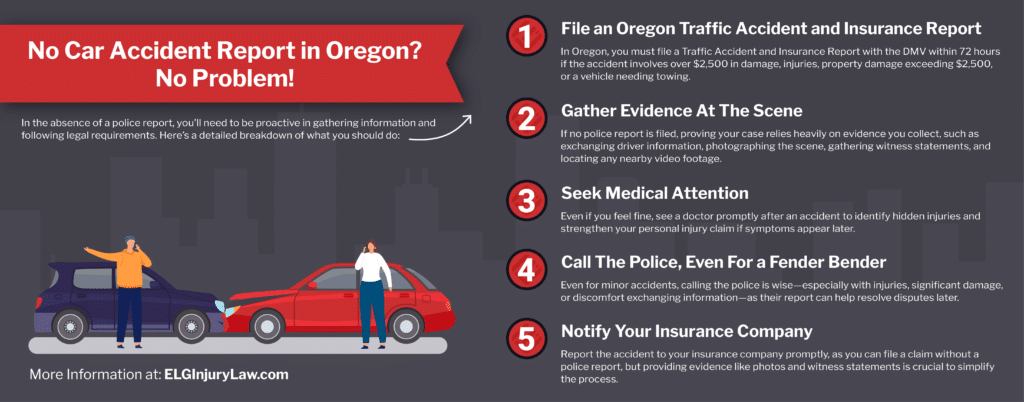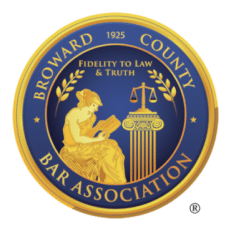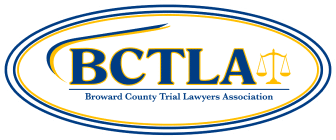What to Do After a Motor Vehicle Accident in Oregon: A Step-by-Step Guide
If you’ve been involved in a car accident in Oregon, especially in areas like Portland, the aftermath can be stressful—especially if no police report is filed. You might wonder, should you file a police report after an accident? Or can you file an insurance claim against the other driver without a police report? These are common questions many people ask when they find themselves in a minor accident. This guide will help you understand the essential steps to take, even if law enforcement doesn’t respond or file an official accident report.
No Cops? No Accident Report? No Problem!
In Oregon, police are increasingly prioritizing accidents involving serious injuries or fatalities. This means that for less severe accidents, such as fender benders, officers may not respond to the scene. As a result, no police report is created by law enforcement leaving you to navigate the often complex aftermath of a car accident on your own. However, this doesn’t mean you can’t proceed with an insurance claim or recover damages for your medical expenses, lost income, and pain & suffering—it just requires careful attention to detail.
Why a Police Report Matters
A police report typically serves as an impartial account of the incident. Police officers are highly trained to fully investigate the scene, speak with witnesses (including all involved drivers), and obtain critical evidence so that they can make a fair & proper determination of which driver was at fault in the accident. Without this independent assessment, insurance companies may have difficulty determining who was really at fault. A problem that is frequently compounded when the real at fault driver falsely blames the injured victim and accuses them of causing the accident when, in reality, it was them. All of which can lead to delays or disputes when filing an insurance claim. So, should you file a police report after an accident? The answer is yes, whenever possible, especially if the damage is significant or if anyone is injured. But if the police don’t show up or don’t take your statement after an accident, don’t worry—there are still steps you can take.

What To Do If There’s No Police Report
In the absence of a police report, you’ll need to be proactive in gathering information and following legal requirements. Here’s a detailed breakdown of what you should do:
1. File an Oregon Traffic Accident and Insurance Report
Oregon law requires you to file an Oregon Traffic Accident and Insurance Report with the DMV within 72 hours of the accident if:
- There was over $2,500 in vehicle damage.
- Someone was injured.
- There was over $2,500 in property damage.
- A vehicle needed to be towed.
It is super important to note that even if the police department files a police report, you are still required to file your own Crash and Insurance Report with DMV.
If you fail to file this report, your driving privileges could be suspended. If you’re unsure whether you need to file the report, contact the DMV Accident Unit at (503) 945-5098 for guidance. You can also click on this link that will take you to the Oregon DMV web page that explains the process and links to fillable PDF accident report forms.
https://www.oregon.gov/odot/dmv/pages/driverid/accidentreport.aspx
Additionally, you can contact ELG Injury Lawyers at (503) 461-5256 and we will be more than happy to offer our guidance on the best way to approach & handle filing a Oregon Traffic Accident and Insurance Report with the DMV. This will really help you to avoid common mistakes that could end up hurting your personal injury case.
2. Gather Evidence at the Scene
If the police did not take your statement after the accident or if no report was filed, your ability to prove what happened becomes more dependent on the evidence you collect. Here’s what to do:
-
- Exchange Information: Be sure to get the other driver’s full name, contact information, insurance details, driver’s license number, and vehicle registration number.
- Take Photos: Document all damage to the vehicles, the location of the accident, and any visible signs that might support your claim, such as skid marks or traffic signals.
- Speak to Witnesses: If any bystanders witnessed the accident, gather their contact information and ask for a statement
- Look for Video Cameras: If your accident occurred in a commercial business area look for & locate any video cameras that might have captured video footage of your accident.
3. Seek Medical Attention
Even if you feel fine right after the accident, you should see a doctor as soon as possible. Some injuries, such as whiplash or internal injuries, may not be immediately apparent but can become symptomatic and start to hurt in the hours, days, and even weeks after an accident. Having a medical evaluation very close in time to your accident will help to discover those latent undiscovered injuries and also strengthen your personal injury claim if injuries arise later.
4. Should You Call the Police for a Fender Bender?
Even though the police may not always respond to minor accidents, it’s still a good idea to call the police for a fender bender, especially if there are injuries, significant property damage, or if you feel uncomfortable exchanging information with the other party. Police documentation, even if minimal, can help clarify the facts if there’s a dispute later.
5. Notify Your Insurance Company
Contact your insurance company as soon as possible to report the accident, even if there is no police report. Many people wonder, can you file a claim without a police report? Yes, you can—though the claims process might take longer or be more complicated. Be sure to provide as much evidence as you can, such as photos, witness statements, and the details you collected at the scene.
How ELG Injury Lawyers Can Help
At ELG Injury Lawyers, we specialize in handling cases where there is no police report or where the police did not take my statement after an accident. We understand how frustrating it can be to navigate the claims process without an official report, and we’re here to make sure you’re not left in the dark.
Our team can help by:
- Helping you to file an online accident report: We will guide and assist you with the filing of an Oregon Traffic Accident and Insurance Report with the DMV. This will really help you to avoid common mistakes that could end up hurting your personal injury case.
- Reconstructing the Accident: We’ll use the evidence you gathered, such as photos and witness testimony, to build a strong case.
- Dealing with Insurance Companies: We’ll advocate for your rights and ensure that your insurance claim is filed properly, even without a police report.
- Fighting for Compensation: Whether you’re seeking compensation for medical expenses, lost wages, or pain and suffering, we’ll work to get you the justice you deserve.
Accidents can be overwhelming, but you can navigate the aftermath effectively with the right support. Contact ELG Injury Lawyers for a free consultation and let us help you pursue the compensation you deserve—no police report required.
No Cops? No Accident Report? No Problem.
While not having a police report after an accident in Oregon can be a challenge, it doesn’t have to prevent you from filing an insurance claim or recovering compensation. Should you file a police report after an accident? Yes, but if one isn’t filed, taking the right steps at the scene and promptly reporting the incident can still help you move forward. Whether you’re dealing with an insurance claim with no police report or facing a complex liability dispute as to who is really at fault for your accident, the experienced team at ELG Injury Lawyers is here to guide you through every step.






